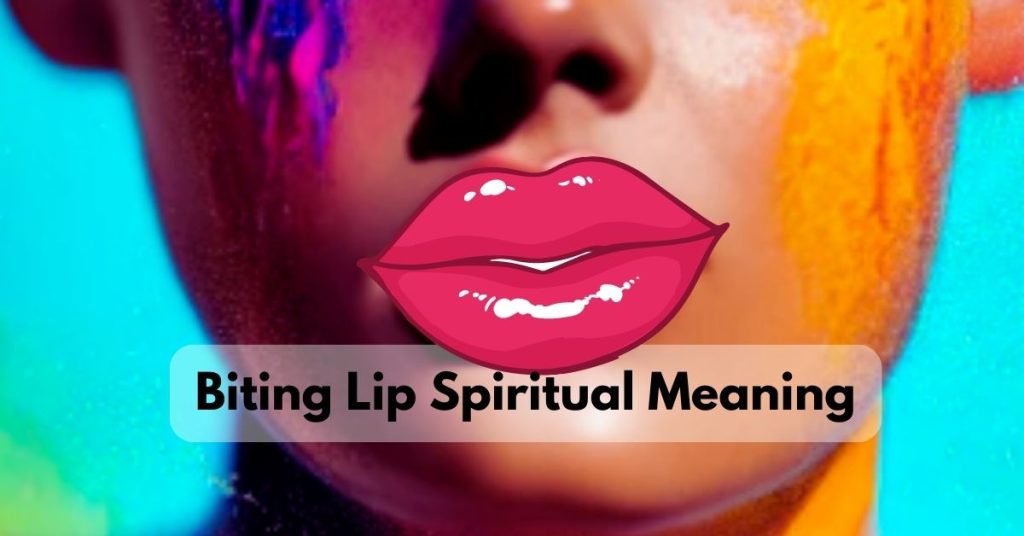Biting Lip Spiritual Meaning? Understanding the Symbolism Behind this Common Habit.
Biting your lip is a common habit that many people do subconsciously. Although it may seem like a harmless behavior, it can hold a significant spiritual meaning. Understanding the spiritual significance of lip biting can help you gain insight into your emotional and spiritual state.
Many cultures and beliefs have different interpretations of lip biting. Some believe that biting your lip can indicate a desire for something or someone, while others see it as a sign of anxiety or stress. In psychology, lip biting is often associated with repressed emotions and a lack of self-expression.
Exploring the spiritual meaning of lip-biting can provide valuable insights into your inner world. Whether you are seeking to understand your own behavior or the behavior of others, this article will provide you with a comprehensive guide to the spiritual significance of lip biting.
Key Takeaways
- Lip biting can hold significant spiritual meaning and provide insight into emotional and spiritual states.
- Different cultures and beliefs have varying interpretations of lip biting, including desire, anxiety, and repressed emotions.
- Understanding the spiritual significance of lip biting can provide valuable insights into the inner world and promote self-awareness.

How did the concept of Lip Biting in the spiritual realm come?
Lip biting is a common habit that many people engage in without even realizing it. However, in some cases, lip biting can have spiritual significance. The spiritual meaning of biting your lip can vary depending on the context and the individual’s beliefs.
One interpretation of lip biting is that it represents repressed anger or frustration. When someone is holding back their emotions, they may unconsciously bite their lips as a way to release tension. This can be a sign that the person needs to find a healthy outlet for their emotions and address any underlying issues that may be causing them to feel frustrated or angry.
Another spiritual interpretation of lip biting is that it represents a desire for intimacy or connection. In some cultures, biting the lower lip is considered a flirtatious gesture that signals attraction and interest. However, this interpretation is subjective and may not apply to everyone.
In some spiritual traditions, lip biting can also be seen as a form of self-punishment or self-denial. This interpretation suggests that the individual is punishing themselves for perceived mistakes or shortcomings, or denying themselves pleasure or happiness.
It’s important to note that spiritual interpretations of lip biting are subjective and may not apply to everyone. However, if you find yourself frequently biting your lips, it may be worth exploring the underlying emotions and beliefs that may be contributing to this habit. By understanding the spiritual meaning of lip biting, you may be able to gain insight into your own behavior and make positive changes in your life.
The Spiritual Significance of Lip Biting
Lip biting is a common habit that many people engage in without even realizing it. However, in spiritual circles, it is believed that lip biting has a deeper meaning beyond just a physical habit. Here are some of the spiritual significances of lip biting:
- Self-restraint: In some spiritual traditions, lip biting is seen as a way to exercise self-restraint. It is believed that by biting your lip, you can control your thoughts and emotions, and avoid saying something hurtful or negative. This practice is especially relevant in situations where you might be tempted to speak out of anger or frustration.
- Tension release: Lip biting can also be seen as a way to release tension and stress. When you bite your lip, you create a physical sensation that can help you focus your attention and release pent-up energy. This can be especially helpful in situations where you might feel overwhelmed or anxious.
- Sexual energy: In some spiritual traditions, lip biting is associated with sexual energy. It is believed that biting your lip can help to channel that energy and direct it towards a specific goal or intention. This can be especially relevant in situations where you might be trying to manifest a new relationship or deepen an existing one.
Overall, lip biting is a practice that has been associated with spiritual significance in many different cultures and traditions. While the exact meaning may vary depending on the context, it is clear that this simple habit can have a profound impact on our thoughts, emotions, and spiritual well-being.
Lip Biting in Different Cultures and Beliefs
Interpreting spiritual symbolism across cultures can be complex and nuanced. It’s essential to note that interpretations may vary within each culture and may not apply to every individual. Below is a table summarizing the spiritual interpretations of biting the lip in different cultures:
| Culture | Spiritual Interpretation of Biting Lip |
|---|---|
| Native American | Suppression of emotions, contemplation, or holding back spiritual insight. |
| Hindu | Sign of modesty, inner conflict, or an attempt to control desires. |
| Chinese | Concealing emotions, politeness, or seeking spiritual balance. |
| Japanese | Symbol of nervousness, politeness, or attempting to hide true feelings. |
| Maori | Expressing anxiety, spiritual tension, or anticipation. |
| Egyptian | Representing concern for the future or a struggle to achieve enlightenment. |
| Celtic | Indicative of hidden thoughts, emotional restraint, or self-reflection. |
| Greek | Sign of emotional turmoil, inner conflict, or an attempt to suppress thoughts. |
| Roman | Expression of uncertainty, introspection, or moral dilemmas. |
| Mayan | Symbol of spiritual introspection, self-awareness, or contemplation. |
| Inuit | Reflection of inner thoughts, emotional balance, or coping with challenges. |
| Tibetan Buddhist | Sign of inner turmoil, spiritual growth, or striving for mindfulness. |
| Nigerian | Expression of shyness, modesty, or a desire to avoid conflict. |
| Australian Aboriginal | Symbol of spiritual sensitivity, emotional awareness, or self-control. |
Psychological Interpretation of Lip Biting
Lip biting is a common behavior that can occur for various reasons, including stress, anxiety, nervousness, or excitement. It is a self-soothing mechanism that provides a temporary sense of relief. However, it can also be a sign of underlying psychological issues that need to be addressed.
Psychologists suggest that lip biting can be a manifestation of anxiety or stress. When people are anxious or stressed, they may unconsciously bite their lips as a way to release tension or to cope with their emotions. Lip biting can also be a sign of nervousness or shyness. People who are shy or introverted may bite their lips when they feel uncomfortable or insecure in social situations.
Moreover, lip biting can be a sign of repressed feelings or emotions. People who have difficulty expressing their emotions may resort to lip biting as a way to suppress their feelings. This behavior can be a coping mechanism for individuals who are afraid of being vulnerable or judged by others.
In some cases, lip biting can be a symptom of a more serious psychological disorder, such as obsessive-compulsive disorder (OCD) or body dysmorphic disorder (BDD). People with OCD may engage in repetitive lip biting as a way to alleviate their anxiety or to satisfy their compulsive urges. Similarly, individuals with BDD may bite their lips excessively as a result of their preoccupation with their appearance.
Overall, lip biting can be a complex behavior that has various psychological interpretations. While it can be a harmless habit, it can also be a sign of underlying emotional or psychological issues. Therefore, it is essential to pay attention to this behavior and seek professional help if necessary.
Lip Biting and Communication
Lip biting is a common habit that many people do without even realizing it. However, in spiritual contexts, lip biting can hold a deeper meaning. Some believe that biting your lip can be a form of nonverbal communication with the universe or with your higher self.
According to some spiritual beliefs, lip biting can indicate that you are holding back something that you want to say. It can be a sign of internal conflict or a fear of speaking your truth. By biting your lip, you may be suppressing your emotions or desires, and this can prevent you from living authentically.
On the other hand, some spiritualists believe that lip biting can be a way to manifest your desires. By focusing your energy on your lips, you can send a message to the universe about what you want to attract into your life. This can be a powerful tool for manifestation, but it requires a deep understanding of your own desires and intentions.
Overall, the spiritual meaning of lip biting is complex and can vary depending on the individual and the context. It’s important to pay attention to your own habits and behaviors and to be mindful of the messages you are sending to yourself and to the universe. By being aware of your own nonverbal communication, you can gain a deeper understanding of yourself and your place in the world.
Conclusion
In conclusion, the spiritual meaning of biting your lip varies depending on the context and culture. However, it is generally associated with holding back emotions, suppressing thoughts, or showing anxiety. It can also be a sign of sexual attraction or desire, especially when done in a sensual or provocative way.
While biting your lip may not have a specific spiritual significance, it can be interpreted as a form of nonverbal communication that conveys your inner state and intentions. It can also be a subconscious habit that reflects your personality and mood.
If you find yourself biting your lip frequently, it may be helpful to reflect on why you do it and what it means for you. Are you suppressing your feelings? Are you trying to appear more attractive or confident? Are you anxious or stressed? By becoming more aware of your behavior, you can gain insight into your emotions and improve your self-awareness.
Overall, biting your lip may not be a major spiritual practice or ritual, but it can be a meaningful and revealing gesture that sheds light on your inner world. By paying attention to your body language and nonverbal cues, you can deepen your understanding of yourself and others.
Frequently Asked Questions
What does it mean when you bite your lip unconsciously?
Biting your lip unconsciously could be a sign of stress, anxiety, boredom, or nervousness. It could also be a habit that you picked up and do without even realizing it.
Is there a spiritual meaning behind biting your lip?
In some spiritual traditions, biting your lip could be a sign of repressed emotions or thoughts. It could also be a way to redirect negative energy or thoughts.
Can biting your lip be a sign of anxiety or stress?
Yes, biting your lip can be a sign of anxiety or stress. It could be a way to cope with nervousness or worry.
What are some cultural beliefs or superstitions surrounding biting the lip?
In some cultures, biting your lip could be a sign of sexual attraction or desire. In other cultures, it could be a sign of dishonesty or deceit.
What does it mean when you bite your lip during meditation or prayer?
Biting your lip during meditation or prayer could be a way to focus your mind or redirect your thoughts. It could also be a way to ground yourself in the present moment.
Are there any medical or physical reasons for biting your lip?
Biting your lip could be a result of certain medical conditions, such as Tourette’s syndrome or obsessive-compulsive disorder. It could also be a side effect of certain medications.
